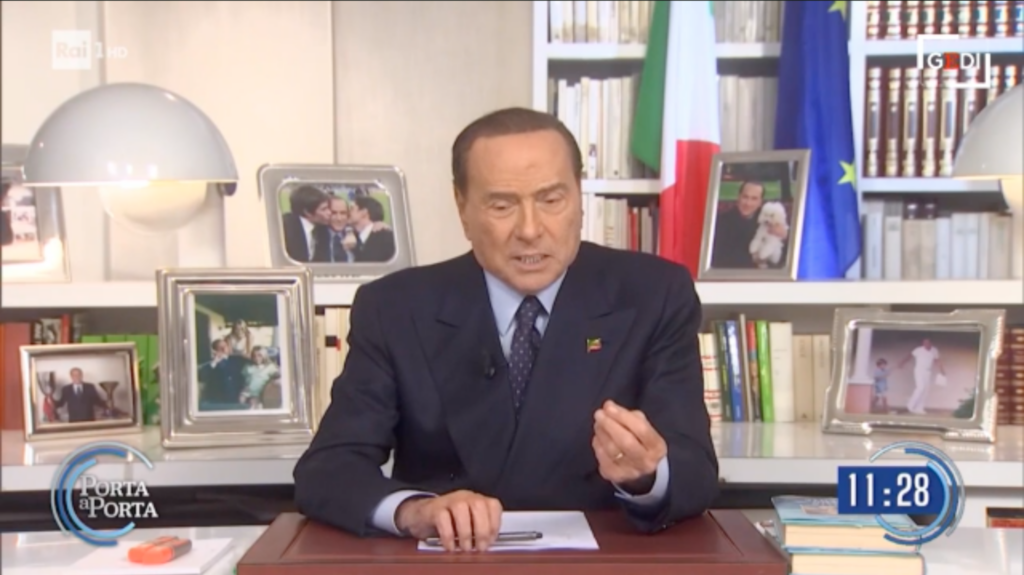In a television interview on Thursday night, Italy's ex-Prime Minister Silvio Berlusconi attempted to excuse the actions of Vladimir Putin and Russia's invasion of Ukraine. After previously condemning the war, the comments are yet more proof that the political right are now ramping up Russian war apologism ahead of Sunday’s elections.
Berlusconi, a long-time ally of Putin (the pair holidayed and allegedly attended “bunga-bunga” parties together) has finally spoken out to defend his Russian friend in the closing stages of the election campaign.
Speaking on prime-time TV, Berlusconi claimed that Putin was pushed by the Russian people to invade over the Donbas "situation" and was forced to carry out the "special operation". He even went as far as endorsing regime change to “replace Zelenskyy’s government with good people".
Italy's ex-Prime Minister even waded in on military tactics, questioning why Russian troops were so spread out across the country rather than just encircling Kyiv.
He claimed the Donbas regions of Luhansk and Donetsk were “pro-Russia” and that Zelenskyy’s troops had "increased" their attacks against the Russian forces, who have occupied Ukraine’s Donbas region since 2014. Berlusconi expressed the Kremlin version of events with little intervention from the host.
From Italy with love
Berlusconi was banned from Ukraine for three years in 2015 for security reasons after he visited Russian-occupied Crimea in Ukraine alongside Vladimir Putin. But the wider Italian rightwing coalition, due to win Sunday's elections, continues to raise serious questions over its ongoing ties to Russia, who has also reciprocated by meddling in Italian politics.
Giorgia Meloni, leader of the far-right Brothers of Italy party, took to Twitter to praise the sham referendum held in Crimea in 2014, organised by Russia to annex the peninsula.
In 2018, Meloni congratulated Putin for his election win, praising the “will of the people”. Despite her pro-Ukraine stance, Meloni (who leads the polls with Brothers of Italy) has been known to change her position on a variety of issues such as the EU, fascism and fiscal responsibility.
Matteo Salvini, leader of the right-wing Lega party, is probably Putin’s closest ally after having signed a cooperation agreement with United Russia (the party that supports Putin) in 2017. There are widespread suspicions that he is funded by Russia, including in Washington’s “Foreign Money Report” which claims Russia has been funding and influencing various political parties in Europe.
Related News
- Russia ramps up interference in upcoming Italian elections
- Italy's PM Draghi announces resignation for second time in a week
- Citizen’s Income: Will southern Italy spoil the right's election hopes?
Giuseppe Conte, the leader of the Five Star Movement, has spoken out against sending arms to Ukraine and has accused Zelenskyy of accepting a "military escalation logic". Conte has said that sanctions are hurting Italians more than Russians. The Five Star Movement’s winning manifesto in 2018 also called for a rapprochement with Russia on foreign policy in a bid to counter America's global influence.
Pro-Russian TV
At the start of the invasion, Italy was one of the few countries that invited Russian ministers and officials onto national television to give the Kremlin side of events. But it was not only just Kremlin officials; many Italian channels, notably the public TV RAI and the Berlusconi-owned Mediaset, also invited a number of Italian pro-Russia commentators.
Russia’s aggression against Ukraine was given the “both sides” treatment on national television, with the pro-Russia side justifying the slaughter of Ukrainian civilians in the name of the so-called "special military operation". There was such an uproar over the coverage of the war, both domestically and internationally, that a parliamentary committee has set up an inquiry on pundits that may be on the Kremlin payroll.
For years Italy has been affected by a very soft stance on Russia as demonstrated by its reliance on Russian gas up until very recently. The prospects of a right-wing coalition, with a resurgent Five Star Movement, could pose serious problems for the European Union.
Asked for a response at the Commission's press conference in Brussels today to Berlusconi's disinformation about Russia's illegal and unprovoked war in Ukraine, its spokespersons declined to comment. The policy is not to "comment on comments" by politicians in the EU member states.

